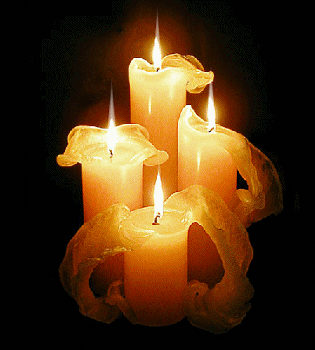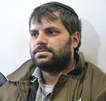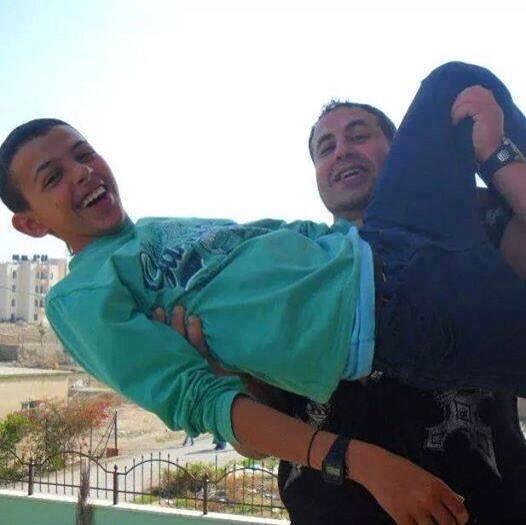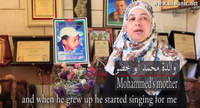4 july 2015

It has been a year since the Jerusalemite child Muhammad Abu Khdeir was savagely burned to death by three terrorist Jewish settlers, but the wound hasn't healed yet and the fire is still burning and it even spread from Jerusalem to the West Bank, Gaza Strip, and the 1948 occupied lands.
Muhammad's bereaved mother, filled with longing for her beloved son, said that her heart is wrenching in pain and her tears never dry.
Muhammad's body left the house but his soul is still living in every corner of his family home.
"I think of Muhammad every single moment, on the first day of Ramadan when I saw that he wasn't sitting with us to have Iftar (the evening meal when Muslims end their fast at sunset) I cried a lot that I couldn't eat as I remembered how he used to help me prepare the table and how he used to fill our home with joy and laughter with his sense of humor," the devastated mother told QPress media center.
She said, “Everything in our home reminds me of him; his clothes and belongings and even his perfume bottle, sometimes I leave the house because I can't stand staying in it."
She bitterly continued: "Muhammad was everything to us, he used to sit on my lap even on the day when he was killed, he used to comfort me when I'm sad and joke with me until he sees a smile drawn on my face."
Memories
The devastated mother showed us photos of Muhammad when he was a baby and photos of him with his friends and family and at the end of the album were his funeral photos.
"If only any of these (photos) would bring my son back to me," she said with her eyes filled with tears and continued: "I was invited to the graduation ceremony of his friends who were with him in the same grade, I wish I didn't go; I felt great grief when I saw his picture on an empty chair."
With pain and sorrow she said: "I wish I were with Muhammad when they attacked him, I would have rescued him, I'm sure that his last words were "Oh, mum!" I was just few minutes away … but that was his destiny."
She concluded saying: "My son was burned alive, what a heinous and cowardly crime! They deprived him of his life, childhood, study, and ambitions yet they believe that they did a heroic act!"
Abu al- Ra'ed, Muhammad's father, said: "Burning my son alive will remain an everlasting stigma of shame on the forehead of Israel". He added: "I don't count on the Israeli racist judiciary; it discriminates between the Palestinians and the Jews, we will go to the international courts."
On the settlers' confessions at the last hearing in the Israeli District Court, Abu al- Ra'ed said: "Our hearts sank in sorrow when the settlers confessed that they beat my son, pumped gasoline into his mouth, and set him on fire burning him alive. We are demanding the Israeli judiciary to burn them the way they burned Muhammad and to demolish their homes."
"The fire in our hearts will never be extinguished, and we are following up on our son's case so that the tragedy never happens again, they burned Muhammad once but we are burning every day," the grieving father said.
Muhammad's bereaved mother, filled with longing for her beloved son, said that her heart is wrenching in pain and her tears never dry.
Muhammad's body left the house but his soul is still living in every corner of his family home.
"I think of Muhammad every single moment, on the first day of Ramadan when I saw that he wasn't sitting with us to have Iftar (the evening meal when Muslims end their fast at sunset) I cried a lot that I couldn't eat as I remembered how he used to help me prepare the table and how he used to fill our home with joy and laughter with his sense of humor," the devastated mother told QPress media center.
She said, “Everything in our home reminds me of him; his clothes and belongings and even his perfume bottle, sometimes I leave the house because I can't stand staying in it."
She bitterly continued: "Muhammad was everything to us, he used to sit on my lap even on the day when he was killed, he used to comfort me when I'm sad and joke with me until he sees a smile drawn on my face."
Memories
The devastated mother showed us photos of Muhammad when he was a baby and photos of him with his friends and family and at the end of the album were his funeral photos.
"If only any of these (photos) would bring my son back to me," she said with her eyes filled with tears and continued: "I was invited to the graduation ceremony of his friends who were with him in the same grade, I wish I didn't go; I felt great grief when I saw his picture on an empty chair."
With pain and sorrow she said: "I wish I were with Muhammad when they attacked him, I would have rescued him, I'm sure that his last words were "Oh, mum!" I was just few minutes away … but that was his destiny."
She concluded saying: "My son was burned alive, what a heinous and cowardly crime! They deprived him of his life, childhood, study, and ambitions yet they believe that they did a heroic act!"
Abu al- Ra'ed, Muhammad's father, said: "Burning my son alive will remain an everlasting stigma of shame on the forehead of Israel". He added: "I don't count on the Israeli racist judiciary; it discriminates between the Palestinians and the Jews, we will go to the international courts."
On the settlers' confessions at the last hearing in the Israeli District Court, Abu al- Ra'ed said: "Our hearts sank in sorrow when the settlers confessed that they beat my son, pumped gasoline into his mouth, and set him on fire burning him alive. We are demanding the Israeli judiciary to burn them the way they burned Muhammad and to demolish their homes."
"The fire in our hearts will never be extinguished, and we are following up on our son's case so that the tragedy never happens again, they burned Muhammad once but we are burning every day," the grieving father said.
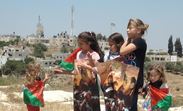
One Palestinian was kidnapped, while four were shot with rubber-coated metal bullets, and scores suffered the effects of teargas inhalation, after Israeli soldiers attacked the weekly nonviolent protest in Nabi Saleh village, northwest of the central West Bank city of Ramallah.
The Popular Struggle Coordination Committee has reported that the soldiers have kidnapped Walid Deifallah, 18 years of age, and moved him to an unknown destination.
The army fired rubber-coated metal bullets and gas bombs at the nonviolent protesters, wounding four Palestinians, while scores of residents suffered the effects of teargas inhalation.
The protesters were marking the first anniversary of the death of Mohammad Abu Khdeir, 16, who was kidnapped and burnt to death, by Israeli extremists in occupied Jerusalem.
They also protested the murder of Mohammad Hani al-Kasba, 17, who was shot while climbing the Annexation Wall, along with dozens of residents, in an attempt to reach the Al-Aqsa Mosque for Friday prayers.
The Popular Struggle Coordination Committee has reported that the soldiers have kidnapped Walid Deifallah, 18 years of age, and moved him to an unknown destination.
The army fired rubber-coated metal bullets and gas bombs at the nonviolent protesters, wounding four Palestinians, while scores of residents suffered the effects of teargas inhalation.
The protesters were marking the first anniversary of the death of Mohammad Abu Khdeir, 16, who was kidnapped and burnt to death, by Israeli extremists in occupied Jerusalem.
They also protested the murder of Mohammad Hani al-Kasba, 17, who was shot while climbing the Annexation Wall, along with dozens of residents, in an attempt to reach the Al-Aqsa Mosque for Friday prayers.
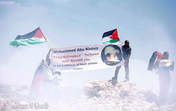
Israeli soldiers attacked, Friday, the weekly nonviolent protest against the Wall and Settlements in Bil’in village, near the central West Bank city of Ramallah, causing scores of residents to suffer the effects of tear gas inhalation.
Coordinator of the Popular Committee against the Wall and Settlements in Bil’in, Abdullah Abu Rahma, said the protesters marched from the center of the village, carrying Palestinian flags, and posters of Mohammad Abu Khdeir, 16, who was abducted by fanatic Israeli settlers last year, before they tortured him, and burnt him to death.
The protesters chanted against the ongoing Israeli violations and assaults carried out by the soldiers, and fanatic settlers, against the Palestinians, their lands and property, called for the liberation of Palestine, and the release of all political prisoners.
Abu Rahma said the soldiers fired dozens of gas bombs and concussion grenades, at the protesters, and targeted Palestinian orchards and farmlands, causing scores of residents to suffer the effects of tear gas inhalation.
The Israeli gas bombs and concussion grenades caused fires in dozens of olive trees, and a farmland planted with wheat. The burnt lands belong to resident Mahmoud Yassin.
In addition, the Popular Committee Against the Wall and Settlements denounced the murder of Mohammad Hani al-Kasba, 17 years of age, was shot while climbing the Annexation Wall, along with dozens of residents, in an attempt to reach the Al-Aqsa Mosque for Friday prayers.
Coordinator of the Popular Committee against the Wall and Settlements in Bil’in, Abdullah Abu Rahma, said the protesters marched from the center of the village, carrying Palestinian flags, and posters of Mohammad Abu Khdeir, 16, who was abducted by fanatic Israeli settlers last year, before they tortured him, and burnt him to death.
The protesters chanted against the ongoing Israeli violations and assaults carried out by the soldiers, and fanatic settlers, against the Palestinians, their lands and property, called for the liberation of Palestine, and the release of all political prisoners.
Abu Rahma said the soldiers fired dozens of gas bombs and concussion grenades, at the protesters, and targeted Palestinian orchards and farmlands, causing scores of residents to suffer the effects of tear gas inhalation.
The Israeli gas bombs and concussion grenades caused fires in dozens of olive trees, and a farmland planted with wheat. The burnt lands belong to resident Mahmoud Yassin.
In addition, the Popular Committee Against the Wall and Settlements denounced the murder of Mohammad Hani al-Kasba, 17 years of age, was shot while climbing the Annexation Wall, along with dozens of residents, in an attempt to reach the Al-Aqsa Mosque for Friday prayers.
3 july 2015
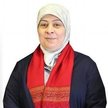
Israeli soldiers detained, on Thursday afternoon, the Governor of Ramallah al-Biereh, Laila Ghannam, as she was trying to cross the Hizma roadblock, north of occupied Jerusalem, on her way to the commemoration service of Mohammad Abu Khdeir.
The soldiers held the governor for more than two hours, and tried to confiscate her mobile phone, and the phones of her delegation members, after alleging they took pictures of them.
In a press conference, Ghannam said Israel and its military are always acting on controlling every aspect of the Palestinian life, through its illegal and immoral occupation.
“They are trying to silence us, especially amidst the Arab and international idleness regarding the ongoing crimes against our people, and the suffering,” she stated, “Despite their violations, our people will remain steadfast and determined to achieve their legitimate rights of liberation, and independence.”
The Palestinians commemorated the murder of 16-year-old Mohammed Abu Khdeir, who was brutally tortured and burned alive by a group of fanatic right-wing Israelis, after kidnapping him one year ago.
The soldiers held the governor for more than two hours, and tried to confiscate her mobile phone, and the phones of her delegation members, after alleging they took pictures of them.
In a press conference, Ghannam said Israel and its military are always acting on controlling every aspect of the Palestinian life, through its illegal and immoral occupation.
“They are trying to silence us, especially amidst the Arab and international idleness regarding the ongoing crimes against our people, and the suffering,” she stated, “Despite their violations, our people will remain steadfast and determined to achieve their legitimate rights of liberation, and independence.”
The Palestinians commemorated the murder of 16-year-old Mohammed Abu Khdeir, who was brutally tortured and burned alive by a group of fanatic right-wing Israelis, after kidnapping him one year ago.
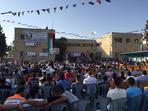
Video
As hundreds of Palestinians gathered in the Shoafat neighborhood of East Jerusalem Thursday, one year after 16-year old Mohammed Abu Khdeir was brutally tortured and burned alive by a group of fanatic right-wing Israelis, Israeli troops amassed around the neighborhood and attacked the marchers with tear gas and pepper spray.
The march was followed by a commemoration ceremony that included Christian and Muslim leaders, and one Palestinian member of the Israeli Knesset (Parliament).
Israeli riot police deployed throughout the area around the march and ceremony, despite the fact that both events were entirely non-violent. The Israeli police attacked the marchers when they attempted a sit-in near the place where Abu Khdeir was killed.
The location where Abu Khdeir was tortured and brutally murdered is the site of the former Palestinian village of Deir Yassin, where Israeli forces committed a massacre of more than 100 civilians in 1948 during the creation of the state of Israel.
It is now the site of an Israeli settlement known as ' Geva Benyamin', and a forest.
As the marchers neared the site, Israeli forces attacked the protest, tear gassing the demonstrators and pepper-spraying Jordanian journalist Nibal Farsakh and an international peace activist directly in the eyes. The police also shoved and hit a number of the demonstrators.
A total of eleven people were injured when the Israeli forces attacked the march.
Banners held by protesters during the march read, "Muhammad Abu Khdeir, July 2, 2014: They kidnapped, tortured and burned you. Be a witness to their crimes."
To mark the occasion of the one year anniversary of the murder of Abu Khdeir, the Palestinian observer at the United Nations, Feda Abdelhady-Nasser, issued a letter to the head of the United Nations calling for justice and an end to Israeli impunity in the killing of civilians.
The letter outlined numerous occasions over the past year in which civilians were directly targeted by the Israeli military occupation forces, and talked about the case of Mohammed Abu Khdeir, saying, "Here, recalling with sorrow all the innocent Palestinian victims of these Israeli crimes, I must recall the heinous crime perpetrated a year ago today against a Palestinian child, Mohammed Abu Khdeir, which shocked our consciences and broke our hearts. Mohammed, aged 16, was abducted from the street outside his home in Occupied East Jerusalem, beaten and driven to a forest, where he was burned alive by a gang of terrorist Israeli settlers. In memory of his son, Hussein Abu Khdeir has said “We don’t forget him. We burn on the inside every time we remember the way he was murdered”.
"We hold the Israeli Government responsible for this crime and the culture of impunity in which Israeli settler have so vilely and continuously assaulted Palestinian civilians, and we join Mohammed’s parents in demanding accountability for the killing of their child and demanding justice for him and for all the Palestinian children that have been brutally killed by the occupying forces and settlers in the name of this illegitimate and belligerent occupation. In this regard, we insist again that the Israeli Government, the Israeli occupying forces and Israeli settler militias belong on the list of grave violators of child rights in the context of the Report of the Secretary-General on Children and Armed Conflict, and we will not relent in calling for such listing in the face of ongoing violations and crimes against our innocent and defenseless children."
Three men are currently standing trial in Israel for the brutal murder of Mohammed Abu Khdeir. Hundreds of other cases of killing and wounding of Palestinians by Israeli settlers and extremists have gone uninvestigated by Israeli forces.
In the year since Abu Khdeir was murdered, numerous members of the victim have been specifically targeted by Israeli forces for abduction, interrogation, detention, beatings, house raids and destruction of their property. The victim's 15-year old American cousin Tariq Abu Khdeir, who was visiting Jerusalem last summer when his cousin was killed, was seized from the street near his cousin's home in the weeks of protests that followed Abu Khdeir's death, and brutally beaten, dragged and kicked in the face repeatedly by Israeli police.
Speaking to a reporter from Agence France Presse on Thursday, Mohammed Abu Khdeir's father said, "His mother cries just at the mention of his name. I'm trying to be strong in front of my children, who've been traumatized by the death of their brother."
"The most important thing is that justice is pursued for my son. I want his killers to spend the rest of their lives behind bars, with no pardon."
As hundreds of Palestinians gathered in the Shoafat neighborhood of East Jerusalem Thursday, one year after 16-year old Mohammed Abu Khdeir was brutally tortured and burned alive by a group of fanatic right-wing Israelis, Israeli troops amassed around the neighborhood and attacked the marchers with tear gas and pepper spray.
The march was followed by a commemoration ceremony that included Christian and Muslim leaders, and one Palestinian member of the Israeli Knesset (Parliament).
Israeli riot police deployed throughout the area around the march and ceremony, despite the fact that both events were entirely non-violent. The Israeli police attacked the marchers when they attempted a sit-in near the place where Abu Khdeir was killed.
The location where Abu Khdeir was tortured and brutally murdered is the site of the former Palestinian village of Deir Yassin, where Israeli forces committed a massacre of more than 100 civilians in 1948 during the creation of the state of Israel.
It is now the site of an Israeli settlement known as ' Geva Benyamin', and a forest.
As the marchers neared the site, Israeli forces attacked the protest, tear gassing the demonstrators and pepper-spraying Jordanian journalist Nibal Farsakh and an international peace activist directly in the eyes. The police also shoved and hit a number of the demonstrators.
A total of eleven people were injured when the Israeli forces attacked the march.
Banners held by protesters during the march read, "Muhammad Abu Khdeir, July 2, 2014: They kidnapped, tortured and burned you. Be a witness to their crimes."
To mark the occasion of the one year anniversary of the murder of Abu Khdeir, the Palestinian observer at the United Nations, Feda Abdelhady-Nasser, issued a letter to the head of the United Nations calling for justice and an end to Israeli impunity in the killing of civilians.
The letter outlined numerous occasions over the past year in which civilians were directly targeted by the Israeli military occupation forces, and talked about the case of Mohammed Abu Khdeir, saying, "Here, recalling with sorrow all the innocent Palestinian victims of these Israeli crimes, I must recall the heinous crime perpetrated a year ago today against a Palestinian child, Mohammed Abu Khdeir, which shocked our consciences and broke our hearts. Mohammed, aged 16, was abducted from the street outside his home in Occupied East Jerusalem, beaten and driven to a forest, where he was burned alive by a gang of terrorist Israeli settlers. In memory of his son, Hussein Abu Khdeir has said “We don’t forget him. We burn on the inside every time we remember the way he was murdered”.
"We hold the Israeli Government responsible for this crime and the culture of impunity in which Israeli settler have so vilely and continuously assaulted Palestinian civilians, and we join Mohammed’s parents in demanding accountability for the killing of their child and demanding justice for him and for all the Palestinian children that have been brutally killed by the occupying forces and settlers in the name of this illegitimate and belligerent occupation. In this regard, we insist again that the Israeli Government, the Israeli occupying forces and Israeli settler militias belong on the list of grave violators of child rights in the context of the Report of the Secretary-General on Children and Armed Conflict, and we will not relent in calling for such listing in the face of ongoing violations and crimes against our innocent and defenseless children."
Three men are currently standing trial in Israel for the brutal murder of Mohammed Abu Khdeir. Hundreds of other cases of killing and wounding of Palestinians by Israeli settlers and extremists have gone uninvestigated by Israeli forces.
In the year since Abu Khdeir was murdered, numerous members of the victim have been specifically targeted by Israeli forces for abduction, interrogation, detention, beatings, house raids and destruction of their property. The victim's 15-year old American cousin Tariq Abu Khdeir, who was visiting Jerusalem last summer when his cousin was killed, was seized from the street near his cousin's home in the weeks of protests that followed Abu Khdeir's death, and brutally beaten, dragged and kicked in the face repeatedly by Israeli police.
Speaking to a reporter from Agence France Presse on Thursday, Mohammed Abu Khdeir's father said, "His mother cries just at the mention of his name. I'm trying to be strong in front of my children, who've been traumatized by the death of their brother."
"The most important thing is that justice is pursued for my son. I want his killers to spend the rest of their lives behind bars, with no pardon."
2 july 2015

A number of journalists and foreigner activists were wounded by Israeli forces during a protest which closed the entrance of Adam illegal settlement, near Ramallah, Thursday.
The protest was meant to commemorate the first annual anniversary of 16-year-old Muhammad Abu Khdeir (16) who was kidnapped and burnt alive by settlers from the Adam settlement, after dawn prayers near Jaba’ village, north-east Jerusalem.
PNN reports that the group of journalists and human-rights defenders had closed down the entrance of the settlement, while Israeli forces opened fire on them, wounding some. Soldiers were reported to have also savagely beat the participants, using pepper spray and sound grenades.
The protest was coordinated by the popular struggle coordination committee, and the PLO movement in Jerusalem.
Soldiers have closed the Jaba’ checkpoint for people travelling from Ramallah towards the south.
The protest was meant to commemorate the first annual anniversary of 16-year-old Muhammad Abu Khdeir (16) who was kidnapped and burnt alive by settlers from the Adam settlement, after dawn prayers near Jaba’ village, north-east Jerusalem.
PNN reports that the group of journalists and human-rights defenders had closed down the entrance of the settlement, while Israeli forces opened fire on them, wounding some. Soldiers were reported to have also savagely beat the participants, using pepper spray and sound grenades.
The protest was coordinated by the popular struggle coordination committee, and the PLO movement in Jerusalem.
Soldiers have closed the Jaba’ checkpoint for people travelling from Ramallah towards the south.
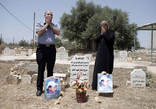
Abu Khdeir's parents mourn at his grave
Slain Arab teen's father says police to blame for murder, deteriorating security situation in East Jerusalem: 'The kidnappers were operating in the area a few days before, and police didn't take this seriously'.
Thursday marks one year since Arab teenager Mohammed Abu Khdeir was kidnapped and murdered by Jewish extremists, raising concerns in Israel the anniversary will be marked with violent clashes in Jerusalem.
The murder, an act of revenge, happened soon after the discovery of the bodies of three Israeli yeshiva students - Eyal Yifrach, Naftali Frenkel and Gil-Ad Shaer - who were kidnapped and murdered by Hamas terrorists. Three Jews were charged with Abu Khdeir's murder: Yosef Ben-David and two minors.
The brutal murder, in which Abu Khdeir was burned alive, led to rioting in East Jerusalem, the West Bank and among Israeli Arabs.
The Arab teen's father, Hussein Abu Khdeir, told Ynet that he was against any violent actions to mark the anniversary. "We will have a ceremony in Mohammed's memory in Shuafat today. I'm not interested in clashes and don't believe there will be any. I told people I didn't want trouble, just a dignified ceremony with dignified people." Christian and Muslim leaders are expected to attend the ceremony, including Jerusalem's Grand Mufti Muhammad Hussein and the Palestinian governor of Jerusalem, Adnan al-Husayni.
The Palestinian Authority has gone out of its way to turn the anniversary into a national and international event. On Wednesday, Abu Khdeir's parents met with Palestinian President Mahmoud Abbas at the Mukataa in Ramallah. During the meeting, Abbas awarded them with the "Medal of Jerusalem" - one of the Palestinian Authority's official awards. On Sunday, a new square will be inaugurated in Ramallah named after Mohammed Abu Khdeir.
According to the indictment, on the night of the murder the three accused got Abu Khdeir into their car, took him to the Jerusalem forest, and burned him to death. Hussein Abu Khdeir said Thursday that the past year has been hell for him and his family. "Mohammed was burned once. Me and his mother are burning every day. They don't even burn animals, so how could people burn someone? They have no heart and no conscience," he said.
Hussein believes the murder of his son was a turning point that changed East Jerusalem. "Before the murder, Shuafat was the most peaceful place in East Jerusalem but since the murder, this entire fabric of life has been destroyed," he said. Over the past year, there has been a significant rise in stone-throwing incidents in the neighborhood, mostly at the light rail, which crosses the main street in Shuafat.
"I place the responsibility to what happened here over the past year on the police. This cell (the three accused in his son's murder) has been operating for a few days before that in the area and they tried to kidnap another child unsuccessfully. The police didn't take this seriously and didn't act. Had the police caught them on time - the entire mess of the murder and what came later would not have happened."
Hussein is the owner of an electricity shop in Shuafat and has always had Jewish customers. He said the same customers continue coming to his store, but cannot comfort him. "They come to the store, look at me and tell me they have no words to express how they feel."
Palestinians mark murder anniversary: 'We want an Intifada'
Procession remembers Mohammed Abu Khdeir, Palestinian teenager who was murdered by Israelis; slain boy's father: State cheers on the racists.
Hundreds participated in a procession Thursday afternoon in the neighborhood of Shuafat chanting, "We want a new Intifada," to mark the anniversary of the murder of Mohammed Abu Khdeir at the hands of Israelis motivated by revenge after three Israeli teens were kidnapped and murdered by Hamas operatives.
Some of the Palestinians threw rocks at Jerusalem's light rail in three separate incidents. No injuries were reported but light damage was caused to a train trailer. Besides these two cases, there were no reports of violence or conflict with Israeli police who maintained a significant presence at the entrance to the neighborhood.
Riot police brought water cannons and an observatory balloon to capture video of events on the ground. Hussein Abu Khdeir, father of the slain teenager, said at the procession, "We still hurt from what they did to my son; it's hard for us to forget this shocking incident. The State should serve the murderers with the most severe punishment. They can't be among people. Sadly, despite the murder, we're still seeing racism and the State doesn't do anything. It cheers on the racists and continues their criminal acts."
Before the procession began, Hussein told Ynet that he was against any violent actions to mark the anniversary. "We will have a ceremony in Mohammed's memory in Shuafat today. I'm not interested in clashes and don't believe there will be any. I told people I didn't want trouble, just a dignified ceremony with dignified people."
The brutal murder, in which Abu Khdeir was burned alive soon after three Israeli teens were kidnapped and murdered by Hamas operatives, led to rioting in East Jerusalem, the West Bank and among Israeli Arabs.
Slain Arab teen's father says police to blame for murder, deteriorating security situation in East Jerusalem: 'The kidnappers were operating in the area a few days before, and police didn't take this seriously'.
Thursday marks one year since Arab teenager Mohammed Abu Khdeir was kidnapped and murdered by Jewish extremists, raising concerns in Israel the anniversary will be marked with violent clashes in Jerusalem.
The murder, an act of revenge, happened soon after the discovery of the bodies of three Israeli yeshiva students - Eyal Yifrach, Naftali Frenkel and Gil-Ad Shaer - who were kidnapped and murdered by Hamas terrorists. Three Jews were charged with Abu Khdeir's murder: Yosef Ben-David and two minors.
The brutal murder, in which Abu Khdeir was burned alive, led to rioting in East Jerusalem, the West Bank and among Israeli Arabs.
The Arab teen's father, Hussein Abu Khdeir, told Ynet that he was against any violent actions to mark the anniversary. "We will have a ceremony in Mohammed's memory in Shuafat today. I'm not interested in clashes and don't believe there will be any. I told people I didn't want trouble, just a dignified ceremony with dignified people." Christian and Muslim leaders are expected to attend the ceremony, including Jerusalem's Grand Mufti Muhammad Hussein and the Palestinian governor of Jerusalem, Adnan al-Husayni.
The Palestinian Authority has gone out of its way to turn the anniversary into a national and international event. On Wednesday, Abu Khdeir's parents met with Palestinian President Mahmoud Abbas at the Mukataa in Ramallah. During the meeting, Abbas awarded them with the "Medal of Jerusalem" - one of the Palestinian Authority's official awards. On Sunday, a new square will be inaugurated in Ramallah named after Mohammed Abu Khdeir.
According to the indictment, on the night of the murder the three accused got Abu Khdeir into their car, took him to the Jerusalem forest, and burned him to death. Hussein Abu Khdeir said Thursday that the past year has been hell for him and his family. "Mohammed was burned once. Me and his mother are burning every day. They don't even burn animals, so how could people burn someone? They have no heart and no conscience," he said.
Hussein believes the murder of his son was a turning point that changed East Jerusalem. "Before the murder, Shuafat was the most peaceful place in East Jerusalem but since the murder, this entire fabric of life has been destroyed," he said. Over the past year, there has been a significant rise in stone-throwing incidents in the neighborhood, mostly at the light rail, which crosses the main street in Shuafat.
"I place the responsibility to what happened here over the past year on the police. This cell (the three accused in his son's murder) has been operating for a few days before that in the area and they tried to kidnap another child unsuccessfully. The police didn't take this seriously and didn't act. Had the police caught them on time - the entire mess of the murder and what came later would not have happened."
Hussein is the owner of an electricity shop in Shuafat and has always had Jewish customers. He said the same customers continue coming to his store, but cannot comfort him. "They come to the store, look at me and tell me they have no words to express how they feel."
Palestinians mark murder anniversary: 'We want an Intifada'
Procession remembers Mohammed Abu Khdeir, Palestinian teenager who was murdered by Israelis; slain boy's father: State cheers on the racists.
Hundreds participated in a procession Thursday afternoon in the neighborhood of Shuafat chanting, "We want a new Intifada," to mark the anniversary of the murder of Mohammed Abu Khdeir at the hands of Israelis motivated by revenge after three Israeli teens were kidnapped and murdered by Hamas operatives.
Some of the Palestinians threw rocks at Jerusalem's light rail in three separate incidents. No injuries were reported but light damage was caused to a train trailer. Besides these two cases, there were no reports of violence or conflict with Israeli police who maintained a significant presence at the entrance to the neighborhood.
Riot police brought water cannons and an observatory balloon to capture video of events on the ground. Hussein Abu Khdeir, father of the slain teenager, said at the procession, "We still hurt from what they did to my son; it's hard for us to forget this shocking incident. The State should serve the murderers with the most severe punishment. They can't be among people. Sadly, despite the murder, we're still seeing racism and the State doesn't do anything. It cheers on the racists and continues their criminal acts."
Before the procession began, Hussein told Ynet that he was against any violent actions to mark the anniversary. "We will have a ceremony in Mohammed's memory in Shuafat today. I'm not interested in clashes and don't believe there will be any. I told people I didn't want trouble, just a dignified ceremony with dignified people."
The brutal murder, in which Abu Khdeir was burned alive soon after three Israeli teens were kidnapped and murdered by Hamas operatives, led to rioting in East Jerusalem, the West Bank and among Israeli Arabs.
